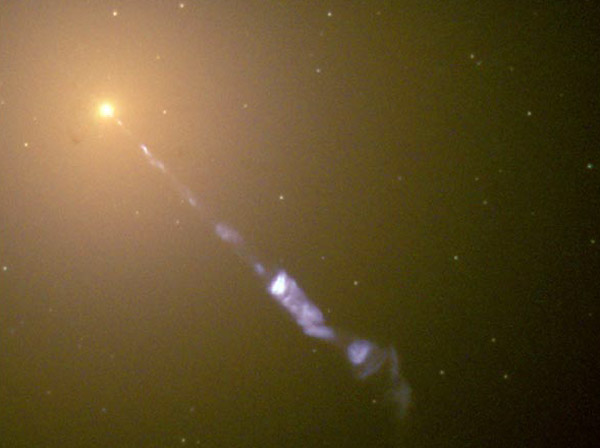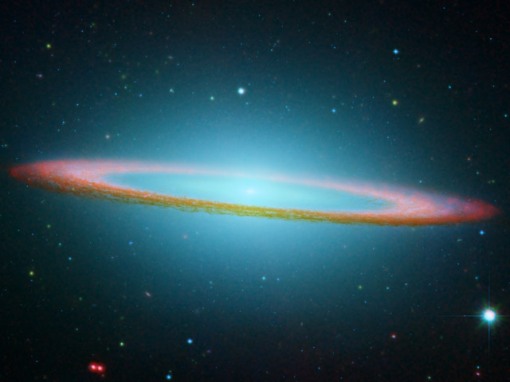APOD: The Sombrero Galaxy from Hubble (2011 May 15)
Re: APOD: The Sombrero Galaxy from Hubble (2011 May 15)
I repeat that we sorely need an Ha light image of the Sombrero. An SDSS g-r-i image would also be good, as would a readily available ultraviolet image. As it is, I think that no real attempt has been made to either reveal or rule out the presence of young massive stars in M104!
<pouts>
Ann
P.S. Okay... this SDSS image of M104 exists:
<pouts>
Ann
P.S. Okay... this SDSS image of M104 exists:
Color Commentator
- NoelC
- Creepy Spock
- Posts: 876
- Joined: Sun Nov 20, 2005 2:30 am
- Location: South Florida, USA; I just work in (cyber)space
- Contact:
Re: APOD: The Sombrero Galaxy from Hubble (2011 May 15)
I was photographing M104 the other night when...

-Noel
-Noel
Re: APOD: The Sombrero Galaxy from Hubble (2011 May 15)
TMBG, famous for science in their music, has an oblique song which I believe is about this galaxy:
http://tmbw.net/wiki/Hovering_Sombrero
http://tmbw.net/wiki/Hovering_Sombrero
Re: APOD: The Sombrero Galaxy from Hubble (2011 May 15)
Somehow, I doubt that, very much:nehushtan wrote:TMBG, famous for science in their music, has an oblique song which I believe is about this galaxy:
http://www.youtube.com/watch?v=9WTZtSX8QUs
Know the quiet place within your heart and touch the rainbow of possibility; be
alive to the gentle breeze of communication, and please stop being such a jerk. — Garrison Keillor
alive to the gentle breeze of communication, and please stop being such a jerk. — Garrison Keillor
-
richard schumacher
- Ensign
- Posts: 14
- Joined: Sat Dec 22, 2007 11:50 pm
Re: APOD: The Sombrero Galaxy from Hubble (2011 May 15)
Another curious feature visible in the full-size image is a faint diagonal jet-like streak running from a point a little below the center of the Sombrero down and right at about 45 degrees. It is apparent in the Hubble heritage (B) image
http://heritage.stsci.edu/2003/28/images/p0328a_B.jpg
but not the others. It is not parallel to the diffraction spikes on the nearby stars.
http://heritage.stsci.edu/2003/28/images/p0328a_B.jpg
but not the others. It is not parallel to the diffraction spikes on the nearby stars.
Last edited by richard schumacher on Mon May 16, 2011 2:06 pm, edited 1 time in total.
Re: APOD: The Sombrero Galaxy from Hubble (2011 May 15)
Rob, thanks for revealing the inner dust lanes. I believe that such dust lanes are often present in bulge-like structures, even though they are usually too faint and wispy to show up in most pictures. In this Hubble Heritage image of the central part of M87 and its jet, faint dust filaments can be seen close to the center of the galaxy:rstevenson wrote:Here's a much larger one.owlice wrote:Rob, thanks for your image! Is it available in a larger size? If so, I'd like to see it. The Sombrero Galaxy usually looks more like a ring galaxy than a spiral to me; your reprocessing makes it look more like a spiral to me.
This time I watched while I did the deed, and it's clear I'm losing a lot of the outer-most ring -- all of the darkest outer ring just disappears. That's because I'm dragging the brightness slider down to -100 (on a scale of 0 to 100) and the contrast slider to +50. Extreme, as I said. But it seems the only way to make those inner dust lanes come clear, at least it is if I start with the Hubble image as published. I suppose I might get better results if I worked on the original single-filter-at-a-time files, but I have no knowledge of how to do that or even where I might find the files to work with. Also, of course, different filters used to image the galaxy might be much better at revealing the dust while not being washed out by the glare of that central bulge.
Rob
There is undoubtedly more dust in the Sombrero galaxy than in M87, and if there are inner dust structures in M87, then surely it's not surprising if we find inner dust lanes in M104.
So why don't the inner dust lanes show up in the Spitzer image? I'd say that's because Hubble is far superior to Spitzer when it comes to resolving small faint features. I don't think the resolving power of Spitzer is enough to bring these features out.
Ann
Oh, P.S.... I tried to thank Noel for showing us ET, but I somehow mislaid my post. Thanks for showing us the true nature of M104, Noel!

Last edited by Ann on Mon May 16, 2011 3:22 am, edited 1 time in total.
Color Commentator
- mexhunter
- Science Officer
- Posts: 467
- Joined: Tue Apr 27, 2010 1:41 pm
- AKA: César Cantú
- Location: Monterrey, Mexico.
- Contact:
Re: APOD: The Sombrero Galaxy from Hubble (2011 May 15)
A classic image. It is always interesting to see.
Nice avatar Noel.
Many greetings
César
Nice avatar Noel.
Many greetings
César
I come to learn and to have fun.
Re: APOD: The Sombrero Galaxy from Hubble (2011 May 15)
When it comes to the Spitzer image, don't miss the "Owl Eyes"! They are brilliantly red in this image:
And since "red" means "dust" in this Spitzer image, those two little rascals are a pair of cosmic dust bunnies for sure! And brimming with hot massive young stars, too.
Ann
And since "red" means "dust" in this Spitzer image, those two little rascals are a pair of cosmic dust bunnies for sure! And brimming with hot massive young stars, too.
Ann
Color Commentator
Re: APOD: The Sombrero Galaxy from Hubble (2011 May 15)
I think I see what you mean.rstevenson wrote:
- The faint inner dust lanes may be tilted somewhat in relation to the overall plane of the galaxy, since the "top" of the galaxy appears to be dished somewhat yet the faint inner dust lanes can be easily seen below the near edge of the main dust ring. It looks to me as if those inner dust lanes are low in the near-left quandrant while being higher in the far-right quadrant.
But could another way to think about it be that those inner dust lanes display more spiral structure than the outer ring? The left quadrant curves towards us, while the right curves away. This would give the illusion of an inner ring tilted in related to the outer ring. Note also that the right side of that inner dust lane is a bit further from the nucleus than the left.
Thanks for your reprocessing, I learnt a lot from it!
Sam
"No avian society ever develops space travel because it's impossible to focus on calculus when you could be outside flying." -Randall Munroe
- rstevenson
- Quis custodiet ipsos custodes?
- Posts: 2705
- Joined: Fri Mar 28, 2008 1:24 pm
- Location: Halifax, NS, Canada
Re: APOD: The Sombrero Galaxy from Hubble (2011 May 15)
Thanks Sam. For some reason I did not look at the M104 page at Wikipedia yesterday. If I had I would have found, about 2/3 down the page, a group of 9 photos, the middle one of which clearly shows the inner dust lanes which are indeed in a spiral pattern.
Rob
Rob
Re: APOD: The Sombrero Galaxy from Hubble (2011 May 15)
Does anyone else do what I do with images from Hubble? After enjoying the main image, I ignore it. I then zoom in as far as I can (usually well before pixellation occurs) and have a hunt at the background. Take this jpg image of the Sombrero Galaxy. It is about 3.1 MB, but decompressed has some 57.26MB's worth of data tucked away. For example, on the lowest part of the main image, about the center, there appear 2 fairly bright stars. Zoom in and just to the right of the star furthest away from the lower edge appears a very unusually shaped galaxy. Have a slow scan with high zoom and be impressed by how much Hubble sucks up, and how little we notice if we just see the main game. Enjoy 
- StarCuriousAero
- Ensign
- Posts: 60
- Joined: Tue Apr 12, 2011 10:20 pm
- Location: California Desert
Re: APOD: The Sombrero Galaxy from Hubble (2011 May 15)
Anyone who knows...Ann wrote:The extreme symmetry of M104 is in itself proof that this galaxy is "quiet" as far as star formation goes.Dustin wrote:Thanks for today's image.
The vast symmetry of that galaxy makes my jaw drop.
Take a look at this SDSS image of basically "red and dead" galaxy NGC 4314 by David Hogg:
...
This regrettably small image shows you an almost all-yellow galaxy with a perfectly straight yellow bar, an oval bulge, a well-formed ring surrounding the bulge and two symmetrical spiral arms. Everything is perfectly symmetrical, and there is no trace of star formation anywhere in this galaxy except in a small ring around the nucleus.
Compare the symmetry of basically all "red and dead" NGC 4314 with the lack of symmetry in massively starforming large spiral galaxies M61, M99 and M101:
...
In M104, by contrast, there is very little star formation, which is why the galaxy is so symmetrical. Even the dust lane is "quiet". In another edge-on galaxy with a lot more star formation, the dust lane is bubbling with "fountains", which are likely the remnants of supernovae or very strong stellar winds from young stellar clusters:
Ann
Does there seem to be an established link between asymmetrical star-forming galaxies and "recent" galactic interaction, either bigger near-ish galaxies or with smaller companions? Do M61, M99, and M101 have nearby gravitational influences while M104 (and other symmetrical galaxies) do not? Is this one of the questions they will be looking to answer through the massive galaxy cataloguing project or does it already have an answer?


